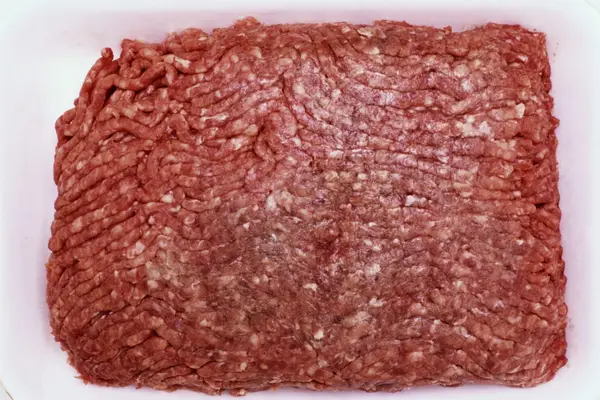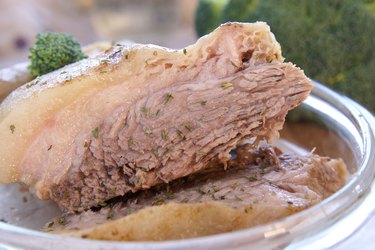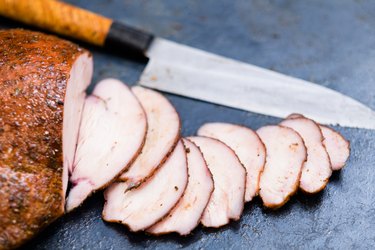Meat can go bad for a wide variety of reasons. Meat goes bad when it’s contaminated with bacteria or fungi, when it’s not stored properly, or when it’s left out in warm weather for too long. Regardless of the reason your meat has gone bad, youll likely become sick if you eat rancid meat.
You can get sick from eating bad meat, even after cooking it. Certain bacteria produce toxins that cant be removed through heat.
Eating spoiled roast beef can make you very sick Even though cooking the meat may kill some bacteria, it does not get rid of the toxins produced by the bacteria that can still make you ill. Here’s a closer look at what can happen if you eat bad roast beef
Identifying Bad Roast Beef
Fresh roast beef has a mild odor and reddish-pink color As it starts to spoil, the color fades to a grayish-brown and the odor becomes sour or rancid Other signs of spoiled roast beef include
- Slimy texture
- Sticky surface
- Green or gray fuzz on the meat
- Strange colors like green, brown, or gray
If your roast beef has a bad smell or shows any of these signs, it has spoiled and should not be eaten.
What Bacteria Are Found In Bad Meat?
Several types of dangerous bacteria can contaminate roast beef and cause it to spoil, including:
-
Salmonella – Causes nausea, vomiting, diarrhea, fever, and abdominal cramps.
-
E. coli – Causes severe stomach cramps, diarrhea (often bloody), and vomiting.
-
Listeria – Causes fever, muscle aches, headache, stiff neck, confusion, loss of balance, and convulsions. Can be fatal in high-risk groups like pregnant women and newborns.
-
Staphylococcus aureus – Causes nausea, vomiting, and abdominal cramps. Can produce toxins that cause even more severe illness.
These bacteria are found in the intestines and feces of livestock like cows. Improper butchering and processing can contaminate the meat. Bacteria can also contaminate the roast through improper food handling and storage.
Can You Get Sick From Eating Bad Roast Beef After Cooking It?
Yes, you can still get sick after cooking spoiled roast beef because of the toxins produced by bacteria.
Cooking the meat kills most bacteria, but it does not destroy the dangerous toxins already produced by the bacteria while the meat was spoiled. These pre-formed toxins can cause food poisoning even if all the bacteria in the meat have been killed by thorough cooking.
For example, the Staphylococcus aureus bacteria release an extremely heat-stable enterotoxin that retains its ability to cause violent illness even after being subjected to boiling or steaming temperatures.
So while cooking spoiled meat may kill the bacteria itself, the harmful toxins often remain in the cooked meat and cause food poisoning when eaten.
What Are the Symptoms of Food Poisoning From Bad Roast Beef?
The symptoms of food poisoning from spoiled roast beef depend on the type of bacterial toxin involved, but can include:
- Nausea and vomiting
- Abdominal cramps and diarrhea
- Fever
- Chills
- Weakness and fatigue
- Headache
- Muscle aches
Symptoms typically begin within 1-3 days after eating the contaminated meat. Some types of food poisoning like listeriosis may take 2-3 weeks for symptoms to appear.
Diarrhea from food poisoning can sometimes be bloody or contain mucus. Vomiting and diarrhea can lead to dehydration, especially in vulnerable groups like infants, elderly, and those with weakened immune systems.
In severe cases, bad roast beef can even cause serious conditions like sepsis, meningitis, kidney failure, and reactive arthritis. Seek medical care immediately if food poisoning symptoms are severe or persistent.
How Long Does Food Poisoning From Bad Roast Beef Last?
The duration of food poisoning illness can range from 1-3 days for mild cases up to 10 days for more severe cases associated with bacteria like Salmonella or E. coli.
Symptoms typically involve an initial period of vomiting and diarrhea, followed by a recovery period of fatigue and gastrointestinal distress as the toxins work their way out of your system.
See your doctor if symptoms don’t start to improve within 1-2 days, or if they last longer than 1 week. Infants, elderly, pregnant women, and those with chronic diseases have a higher risk of severe illness and complications.
How To Prevent Food Poisoning From Roast Beef
You can prevent food poisoning by handling roast beef properly:
-
Cook thoroughly – Use a food thermometer to ensure roast beef reaches an internal temperature of at least 145°F. Ground beef should reach 160°F.
-
Refrigerate promptly – Leftovers should be refrigerated within 2 hours. Don’t leave roast beef at room temperature for more than 1 hour.
-
Watch storage times – Store fresh roast beef in the fridge for no more than 3-5 days. Freeze if keeping longer than that.
-
Avoid cross-contamination – Use separate cutting boards and utensils for raw roast beef and ready-to-eat foods. Wash hands thoroughly after handling raw meat.
-
Inspect carefully – Check roast beef before cooking for any signs of spoilage. Discard if it has a bad odor, sticky texture, or strange color.
Following safe food handling and cooking practices can help prevent bacterial contamination and growth that leads to spoiled roast beef. When in doubt, remember the old adage – “When in doubt, throw it out!”
Eating bad roast beef can definitely make you sick. Cooking may kill the bacteria, but not the dangerous toxins some bacteria produce. Your best bet is to identify spoiled roast beef by sight and smell, and discard it before eating. With proper food safety precautions, you can avoid the miserable experience of food poisoning from roast beef gone bad.

Identifying Rancid or Rotten Meat
Rancid meat is easy to identify. The USDA says that bad meat usually has a distinct scent and may even be discolored. The smell of rancid meat might remind you of sulfur or even ammonia.
Video of the Day
Red meat, like beef, has a naturally mild odor. It tends to smell sour when it begins to go bad. Fresh pork usually has a mild smell or no smell at all. When pork smells bad, the odor is much more obvious.



Rotten meat is more likely to have discolorations. Your meat may have a gray-green, brownish-green or green tint. If you see grey fuzz or green dots on the surface of your food, the USDA says that mold has likely grown throughout your meat.
The easiest way to tell if your meat is bad is to look at its texture. Fresh meat should be firm and moist. If your meat is slimy or sticky, it’s likely that bacteria have spread through it. Dont eat meat if you think its rancid or rotten.
Food Poisoning and Symptoms
There are many different types of bacteria that can make your meat go bad. Bacteria can come from either the animal (most often from its gut) or from people, especially if they didn’t wash their hands before cooking. Its also possible for bacteria to come from unclean kitchen equipment.



Pathogenic bacteria such as salmonella, staphylococcus and E. coli are particularly likely to make you sick. The Mayo Clinic says that certain types of these bacteria can make you sick even when you consume them in small amounts.
If you eat meat that has been contaminated with these bacteria, youll probably end up with food poisoning. According to the Mayo Clinic, food poisoning symptoms include nausea, vomiting, fever, abdominal pain and other gastrointestinal issues. Certain strains of pathogenic bacteria are known to cause bloody diarrhea. Food poisoning can last from a few hours to a few days.
Fresh meat should only be kept for a few days in the fridge. The US Food Fresh red meats like beef, pork, and lamb can be kept in the fridge for up to five days.
If you leave meat in the refrigerator for longer than this, it will slowly start going bad. Fortunately, you can prevent your meat from going bad by freezing it. Meat can be kept in the freezer for up to 12 months.
The way you handle your meat prior to cooking it can also influence bacterial growth. According to the USDA Food Safety and Inspection Service, bacteria can multiply quickly at temperatures between 40 and 140 degrees Fahrenheit. Making sure that your meat spends minimal amounts of time at this temperature range can help prevent food poisoning.
The best way to prevent food poisoning is by cooking your meat thoroughly. Regardless of whether your meat is frozen or fresh, the U.S. Department of Health & Human Services recommends that you cook it to an internal temperature of 145 degrees F. Chicken is considered safe when its been cooked to an internal temperature of 165 degrees F.
Unfortunately, you might still get sick even after youve thoroughly cooked your food and killed any bacteria. This is because of the toxins that certain bacteria release. These toxins can also produce food poisoning symptoms. references.
How can I tell if my meat’s gone bad?
FAQ
What happens if you eat spoiled roast beef?
How long after eating bad beef do you get sick?
What does spoiled roast beef smell like?
What happens if you eat bad beef?
If you discover you ate bad beef, yet do not experience symptoms immediately, do not continue to eat the meat, assuming that the symptoms will not occur. Dispose of it and clean any surfaces that came into contact with it with disinfectant, soap and water. Read more: Food Poisoning Culprits: Sprouts and 7 Other Risky Foods
Is eating a lot of meat bad for the body?
Consuming the right amount of meat is not bad for you, but too much of it is not good for you because you are also consuming a lot of meat fat. Animal fats contain high levels of saturated fatty acids, which increase the risk of adverse health effects. There are also reports that people who consume more processed meat products such as ham and sausage than meat itself have an increased rate of heart disease and atherosclerosis.
What happens if you eat a spoiled beef roast?
A spoiled beef roast can contain several pathogenic bacteria which can lead to many foodborne diseases. The first symptom you’ll notice after possibly eating a bad beef roast is diarrhea. Whenever bad food enters your body, it will do its best to try to get rid of it. Due to this, vomiting and loose stools are commonly observed.
Can you eat a bad beef roast?
Merely putting in spices and letting the beef cook will not make a good roast. Rather it is the freshness of the meat that counts the most. If the beef is fresh, the roast will turn out delicious. Otherwise eating a bad beef roast will not only leave you hungry but also upset your digestive system.
